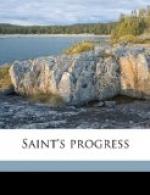about Germany and other countries, and neither of course
had any real knowledge of any country outside their
own; for, though both had passed through considerable
tracts of foreign ground at one time or another, they
had never remarked anything except its surface,—its
churches, and its sunsets. Again, both assumed
that they were democrats, but neither knew the meaning
of the word, nor felt that the working man could be
really trusted; and both revered Church and, King:
Both disliked conscription, but considered it necessary.
Both favoured Home Rule for Ireland, but neither
thought it possible to grant it. Both wished
for the war to end, but were for prosecuting it to
Victory, and neither knew what they meant by that
word. So much for the large. On the narrower
issues, such as strategy, and the personality of their
country’s leaders, they were opposed.
Edward was a Westerner, Robert an Easterner, as was
natural in one who had lived twenty-five years in Ceylon.
Edward favoured the fallen government, Robert the
risen. Neither had any particular reasons for
their partisanship except what he had read in the
journals. After all—what other reasons
could they have had? Edward disliked the Harmsworth
Press; Robert thought it was doing good. Robert
was explosive, and rather vague; Edward dreamy, and
a little didactic. Robert thought poor Ted looking
like a ghost; Edward thought poor Bob looking like
the setting sun. Their faces were indeed as curiously
contrasted as their views and voices; the pale-dark,
hollowed, narrow face of Edward, with its short, pointed
beard, and the red-skinned, broad, full, whiskered
face of Robert. They parted for the night with
an affectionate hand-clasp. So began a queer
partnership which consisted, as the days went on,
of half an hour’s companionship at breakfast,
each reading the paper; and of dinner together perhaps
three times a week. Each thought his brother
very odd, but continued to hold the highest opinion
of him. And, behind it all, the deep tribal sense
that they stood together in trouble, grew. But
of that trouble they never spoke, though not seldom
Robert would lower his journal, and above the glasses
perched on his well-shaped nose, contemplate his brother,
and a little frown of sympathy would ridge his forehead
between his bushy eyebrows. And once in a way
he would catch Edward’s eyes coming off duty
from his journal, to look, not at his brother, but
at—the skeleton; when that happened, Robert
would adjust his glasses hastily, damn the newspaper
type, and apologise to Edward for swearing.
And he would think: ’Poor Ted! He
ought to drink port, and—and enjoy himself,
and forget it. What a pity he’s a parson!’




